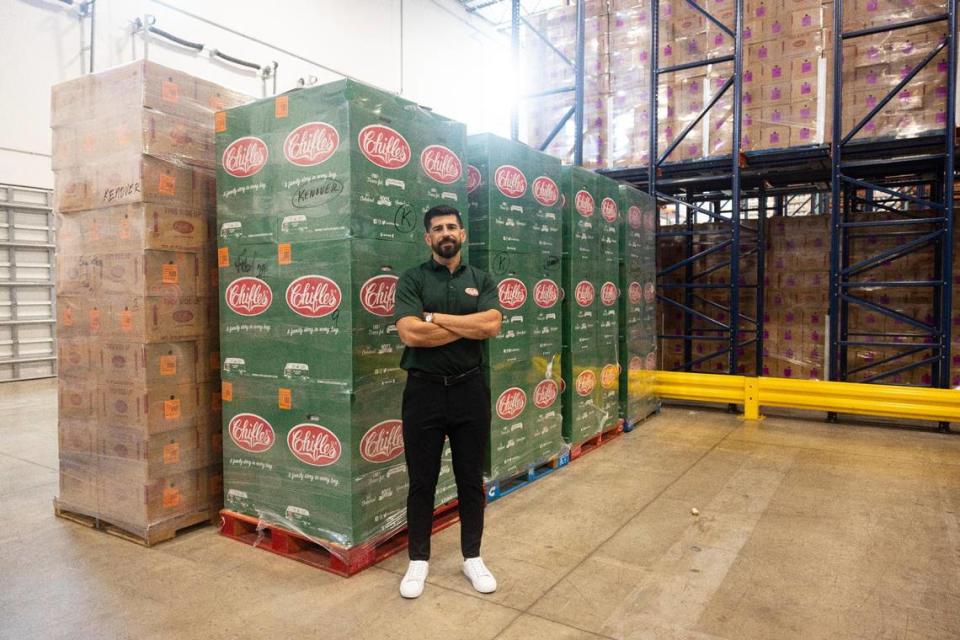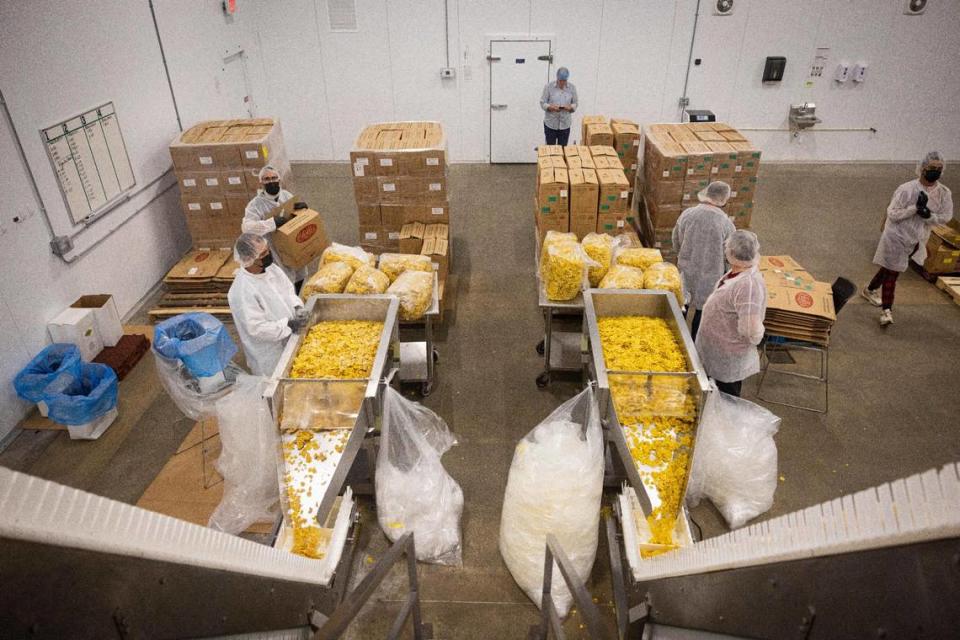After 2017 fire, Chifles resurges near North Miami to become top U.S. plantain chip maker
Chifles CEO Tony Rivas Jr. ambled around the plantain chip company’s headquarters and production area near North Miami, as if he was Willy Wonka at the chocolate factory.
He quickly washed his hands, put on a hairnet to go inside the packing area. He told a recent visitor to follow him into the area of machines whirring and plantain chips moving along conveyor belts, before they were bagged for shipping to supermarkets and food retailers in various parts of the United States, Puerto Rico and the Bahamas.
Plantains are a heartier type of banana grown in tropical environments in Central and South America. They are eaten in a variety of ways or used to make a salty snack food. Chifles plantain chips are packaged inside green and yellow bags that resemble the colors of plantains. Sixteen chip varieties can be found on store shelves at Publix, Walmart, Sedano’s, or other local food stores in 11 states mostly on the East Coast and in the Southeast.
This summer, the 40-employee snack food company marked 60 years in business. That’s quite an achievement after the harrowing event that occurred six years ago.
One Friday night in November 2017 at Chifles former company headquarters in Tampa, drums of leftover plantain chips that needed to be disposed caught fire.
“If you’re not putting water in those drums filled with those hot chips, instead of cooling down with time, they actually get hotter,” Rivas, 44, recalled. “There’s a chemical reaction. They get hotter and hotter until they ignite.”
While no one was in the Tampa building when the fire started, the 800-degree blaze burned nonstop for 14 hours. The Rivas family ended up losing everything four months after putting enough money together to buy the Chifles plantain chip company from its founders Segundo and Peggy Argudo.
After the plant burned to the ground, Chifles was on the verge of going out of business. Because many of the company’s distributors lived solely off selling the plantain chips, they also would have gone under. To find an immediate solution, Rivas, a distributor prior to becoming an owner, worked with a competitor to package Chifles chips. But that didn’t last long, forcing Rivas to look for another way to keep his company afloat.
“One of the guys that was sourcing me fruit asked if he could just send the chips already made and we pack them here,” he said. “I said that we’ll do that as a kind of a stopgap, until we build our new plant.”
Distributors handled packing the plantain snacks after the fire, until Chifles moved its entire operation to Miami in March 2020 to a new plant built using insurance coverage on the Tampa property.
While the 2017 fire was a horrible event for the company, it ended up positively changing the course of Chifles. Before it happened, the chip maker would acquire plantains that were sometimes 10 days old to cook into chips. Since plantains can ripen over ten days, the transit process made it difficult to preserve their freshness upon arrival in the United States.
By having a contractor make and send the chips already prepared in their country of origin to Chifles for packaging, Rivas found a way to produce fresher, more flavorful chips that come in garlic, lime, gluten free, sweet and several other varieties.
By March 2018, the company’s leader knew there was no going back to the old way of doing business. Cooking the chips in Ecuador and other South American locations resulted in a better taste — and ultimately higher profit margins for the company.
“The minute that it turned around, it was just like this brilliant, beautiful golden yellow color,” he said. “There was this crunch, this texture.”
Cultural customer connection
Plantain chip eaters like Little Havana technologist Ashley Caines, 34, got hooked on the crunchy snack. She grew up in the Bronx, New York and has a sentimental connection to plantain chips. With her Puerto Rican mother Yolanda and father Wesley from St. Kitts, Caines often ate platanos maduro, which are ripe plantains, and tostones, plantain pieces that are flattened and fried hard. When she began taking the bus to school from the sixth to eighth grades, she would go into her neighborhood deli for Chifles plantain chips to eat along the way and enjoyed how they reminded her of her family’s food.
“It was a faster way to get that flavor of the thing that I was making with my grandmother or making with my mom at home,” she said. “And then it was off to the races wherever I moved and moved around a lot. I went to boarding school. I lived in different cities and stuff like that that don’t necessarily have Caribbean influence.”
When Caines attended Milton Academy, a boarding high school 10 miles outside of Boston, she remembers receiving special care packages from her mother during her freshman year.
“I would get these wonderful gifts and she would send me plantain chips in my care box,” she recalled. “That was like my most coveted thing in my dorm until the bag was done. I just loved it so much.”
From distributor to owners
The Rivas family’s connection to Chifles chips goes back a generation. Rivas’ father Tony Rivas Sr., 70, owned Borges Distributors and distributed the plantain chips to grocers for 50 years. The elder Rivas, who emigrated to the United States from Cuba at the age of 14, was proud of the work his company did to become the largest Chifles distributor in Florida. When the Argudo family sought a buyer for the Tampa business they started in 1963, the Rivas family saw a natural opportunity.
The company’s move to its North Miami headquarters after the 2017 fire also allowed the younger Rivas to have a better quality of life for his growing family. When the company was based in Tampa, he would commute from Miami to work at the Tampa plant. The first of his Tony Rivas Jr.’s two sons was born two weeks after his family bought Chifles and he credited his wife, Frances, with helping him realize his entrepreneurial dream.

As Chifles works to get its chips into the hands — and mouths — of more hungry consumers, Rivas turned to a U.S. airline to help with that. The company struck a deal in 2022 with New York-based JetBlue Airways to hand out the salty snacks on its flights. Rivas estimated that a million JetBlue passengers a month get to munch on the plantain chips on JetBlue flights.
“We are very proud to have partnered with Chifles last year to bring their savory, low-sodium and gluten-free plantain chips to customers at 35,000 feet, making us the only U.S. airline to carry plantain chips,” A JetBlue spokesperson said. “When rotating our onboard snack offerings, we are always looking to introduce customers to new products ... such as Chifles. Chifles brings a traditionally Hispanic snack into the mainstream and we are proud to serve them.”
Stella Quintero, a Florida Atlantic University hospitality management instructor, attributed Chifles’ success to an emergence of diverse consumer tastes over the past 15 years.
“Plantain chips are consumed by many countries around the world,” she said. “If you look at trends for growth through 2030 but the potential for growth is huge.
A 2021 study by a snack food industry consultant estimated the global snack food market is valued at $18 billion and expected to increase to $27 billion by 2028.
Plantain chips represent a fraction of the overall snack food market. Research shows that the global plantain chip market reached a value of $422 million in 2022, and is expected to reach a valuation of $556 million by 2028.
Citing the National Restaurant Association’s three culinary trends in 2023 of Southeast Asian, Caribbean and Latin American cuisines, Quintero said plantain chips reflect two of the three trends and indicate that a consumer shift is happening in snack food consumption.
Leaning into growth
Meanwhile, as Rivas showed off art from Miami artists on the company’s walls at the Miami home office, he’s optimistic about Chifles brand’s growth prospects. There are new varieties of Chifles chips in the works that he wouldn’t divulge and plenty of room to expand the brand’s reach to many of the 39 states in America where the chips are not sold. He also declined to disclose annual revenue of the nation’s top plantain chip maker.
“I just put my head down,” he said. “I keep doing what’s been working for us for the last 60 years, and I’m confident that it’s going to continue to work.”


